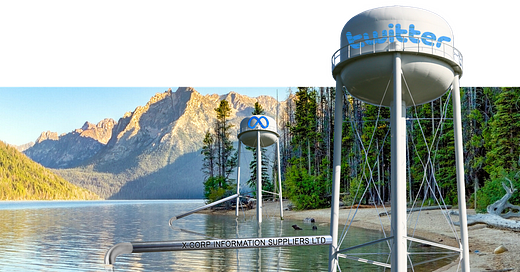Lead in the Pipes: Who Pays Your Information Supplier?
The Internet's problem with the "last mile" of news delivery.
“A truth that's told with bad intent beats all the lies you can invent.” ― William Blake
Between writing the bulk of this essay and now, both NPR and PBS announced they would no longer be posting to Twitter. I think this is wonderful news, because the way I see it- their absence helps dispel the fantasy —one that many intelligent people I know believe— which is that Twitter has news on it.
Readers of Stay Grounded know that I often compare our information diets with real diets classifying apps as “Junk food” or “Whole grains”, etc. Extending this analogy, we can say that news is like the water of our information diets:
The closer you are to the source, the easier it is to trust the purity.
If someone hands you a cup and asks “does this taste weird to you?” It always will.
And when mixed with other things, it stops being water.
A Tale of Two Sources
Where do you get your water? One of two responses will likely spring to mind when answering the question. Either:
The tap/bottle
~ or ~The Spokane Valley–Rathdrum prairie aquifer
Both are correct (assuming you both own a faucet and live in the greater Spokane metropolitan statistical area), but we can bet that most people when pouring a glass of the clear stuff, are just thinking of their faucet and not considering the the distant origin or it’s route to their kitchen. What is the source like? Is anything being added? Is it picking up any contaminants? What are the pipes like? Is this whole process being double-checked by someone?
All these things can affect both the safety of water and your perception of it. And generally speaking, there are no “extras” in our supply1. For Spokanites (and most of America), citizens are paying money (taxes or otherwise) to ensure reliable and safe transport from the source to their homes, unadulterated.
Now, imagine if a local municipality decided to reduce taxes by giving control of the supply and transport to private, largely unregulated companies who would then offer the water for “free”. Lower taxes and free water? Win-win? But where’s the incentive to ensure it’s pure?
This is essentially the system we have for delivering news today. Even assuming the “wellspring” of news is manned by honest journalists with a passion for integrity (not always the case) the pipes, additives and distribution networks for our information are run by companies who make their money behind-the-scenes in order to provide the “product” for free.
Humans read news to help define our sense of broader reality. So here’s a question for information-learners: What level of control over your perception of reality are you willing to cede to for-profit companies who’s main priorities do not involve distributing the fairest and most honest assessment of reality of which they are capable? Yes, social media companies are serving news, and yes, it may originate from credentialed journalists, but a lot happens in the pipelines that most people don’t consider.
You’ll often hear “Don’t get your news from Twitter/Facebook/Reddit”, to which the common response is: “But this news is from a reputable publication that’s simply posted it to Twitter/Facebook/Reddit!”. And yes, following healthy news publications on social media is an improvement over following untrustworthy outlets; but those companies have algorithms of their own, and those algorithms are not oriented towards serving it’s users a balanced news diet. They’re oriented towards getting users to click. And even true stories from trustworthy journalists without misleading headlines can still be manipulated in how they’re presented. Think about it: when has a quote-tweet ever said “Read this article before you read my opinion of it”?
“But people demand it!”
Imagine if one of the “free” water companies mentioned above put an addictive substance into the supply that also caused the water to be less hydrating. “More people are drinking our water” they would tout, “consumption is way up from before, people say they want pure, clean water without additives, but the numbers say otherwise.”
Even assuming no other negative side effects (not the case with social media), would you willingly become addicted to a substance for no reason? The main benefits being touted by social media (“connecting” with friends and/or “having your finger on the pulse”) already have healthier and more effective real-world analogues. And the “news” social media is providing is both more addictive (by virtue of its short-format emotionally charged clickbait takes), and more importantly: less educational.
If your town decided to do this with your water supply, how would you react? If you care about your health, you’d probably (begrudgingly) start paying out of pocket for bottles of water, because it’s the most trustworthy option.
Supply-side Journalistic Integrity
Consider the perspective of an honest journalist driven by a passion for truth, evidence-based reporting, justice for all, et cetera. In the pre-internet world, there was only so much news being printed at a given time. The question to consumers was not “what should I read?” but “What could I read?” because the list of “current events” available at any given time was exhaustible in an afternoon. Nowadays, most of us wake up to a fire hose of (true and false) information being blasted to us from mobile devices, and it doesn’t stop until we go to sleep. Even the most diligent consumers of news media still struggle to find balanced perspectives when they’re actively seeking it, which most consumers aren’t.
How is the ethical journalist supposed to get a story noticed when the “marketplace of ideas” is over-saturated with exaggerated, emotionally-charged, or just straight up wrong information? The answer is they have to play along. They have to work with the (for-profit) algorithms because they cannot go outside of them when most of the population is getting their news on social media.
Emotions will always outpace logic in the human brain. We feel first and think second. Our electronics have become so fast, that in the half-second before our rational minds can talk us off the ledge of becoming enraged by a sensationalized headline, the algorithm has already served up it’s next helping of emotional (ie: addictive) content. Or perhaps you’ve already clicked on the first link without really thinking about it, since the button was placed just a few millimeters from your thumb to begin with.
“Surely this headline can’t be accurate.” The reader thinks, as their brain jump starts the process of considering the implications if it were.
In a world where algorithms are dialed in to exploit this human failing and the indulgence is only a tap away, the ethical journalist is faced with a Sophie’s choice, either they:
Maintain all integrity, knowing that their work cannot compete in the poisoned well that is social media’s bottomless “marketplace of attention”.
Compromise standards by using a “clickbait” headline, knowing a lower percentage of people will read the full article before sharing.
Compromise in some other way, such as using simpler and less nuanced language, knowing that reader’s attention spans are minimal.
Most (ethical) journalists opt for the latter options. The attention-guiding algorithms certainly aren’t going to boost dry logical content, and meanwhile everyone still has to eat.
The facts:
Social media (and search) companies are:
Prioritizing emotional (sensationalist) stories over nuanced ones (either algorithmically or as a consequence of human proclivity to focus on such content).
Encouraging the framing of “good” journalism in an emotional context, often a political or culture war issue (“X is ‘good for Democrats’, etc”) thus limiting receptiveness across the political spectrum.
Treating all content (news, fake news, memes, etc) as equal.
Encouraging journalists to sacrifice integrity and twist their stories to perform better for the algorithm/audience.
Diluting a deeper cultural understanding of the news by means of pushing an overwhelming volume of shallower content.
Until the lead is out of the pipes, it’s in everyone’s individual and societal interests to collect their own “water”. Go directly to the source(s). Pay for it with money. Yes, it’s more work, but it’s the only way to guarantee what you’re consuming is authentic. If you care about democracy, care about your community, or even just desire a firm grasp on reality- don’t get your news from social media.
Extra note: A lot of what we see in our “news” feeds isn’t news. A while back I wrote two pieces about what actual news is, and also what it isn’t. I find that remembering the distinction is very helpful when navigating online spaces.
Aside from fluoride of course, a benefit to teeth owners.






